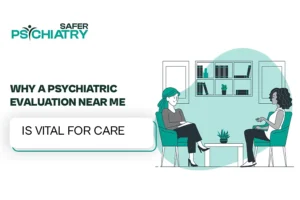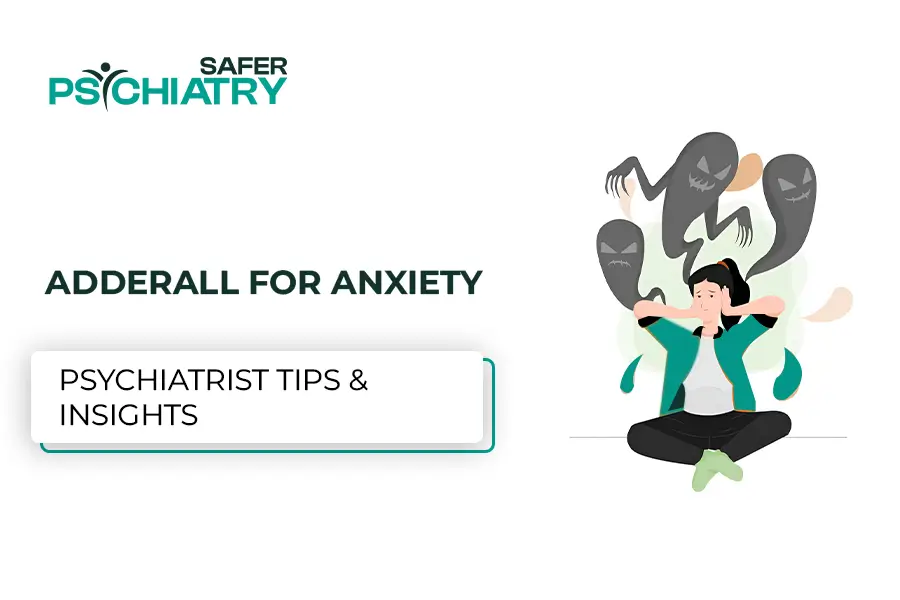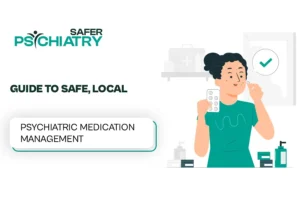
Adderall for Anxiety - Benefits, Risks,
and Psychiatrist Insights
At Safer Psychiatry, we provide compassionate, evidence – based mental health care to support your well-being now and for the future – because your journey matters, and so do you.

- Adderall is not FDA-approved for anxiety. It is a stimulant for ADHD and narcolepsy not an anxiety medication.
- Adderall may worsen anxiety by increasing heart rate, jitteriness, and racing thoughts.
- Low-dose Adderall for anxiety is extremely rare and only used when ADHD and anxiety overlap.
- Better ADHD meds for adults with anxiety often include non-stimulants (Strattera, Intuniv) or SSRIs/SNRIs not Adderall.
- Always consult a psychiatrist before start, stop, or adjust Adderall.
What Is Adderall?
Adderall is a stimulant medication containing amphetamine and dextroamphetamine. It increases dopamine and norepinephrine levels to improve:
- Focus
- Motivation
- Alertness
- Cognitive performance
It is primarily prescribed for:
Adderall for Anxiety - Does It Work?
Many patients wonder whether Adderall helps anxiety. Especially when they struggle with both ADHD and anxiety. However, Adderall is not considered a treatment for anxiety disorders.
Why Adderall usually does NOT help anxiety
- It raises heart rate and blood pressure. Which can feel like anxiety?
- Side effects often include nervousness, irritability, jitteriness, and insomnia.
- It may worsen panic-like symptoms in sensitive individuals.
- Using Adderall use for anxiety without ADHD can increase the risk of misuse.
When it may help indirectly
For patients who have ADHD + anxiety, improving focus may reduce overwhelm. Which can make anxiety feel more manageable? This is why some people say “Adderall cured my anxiety and depression”. But this is not typical or medically expected.
Why Adderall May Cause Anxiety
Adderall stimulates the central nervous system (CNS). For people prone to anxiety, this can result in:
- Racing heart
- Restlessness or insomnia
- Racing thoughts
- Heightened “fight-or-flight” response
For some, Adderall XR for anxiety may reduce peaks and crashes, but dosage still matters.
Alternatives - Best ADHD Medication for Adults with Anxiety
If both ADHD and anxiety are present, psychiatrists often avoid strong stimulants and consider:
Non-stimulants
- Strattera (atomoxetine)
- Intuniv (guanfacine)
SSRIs/SNRIs for anxiety
- Zoloft
- Prozac
- Effexor
Stimulant comparisons
- Viviane vs. Adderall for anxiety: Viviane feels smoother and may have fewer peaks/crashes.
- Ritalin vs. Adderall for anxiety: Some patients tolerate Ritalin better.
How to Manage Adderall-Related Anxiety
If you notice anxiety after taking Adderall:
- Ask your psychiatrist about dose adjustment or switching to XR.
- Limit caffeine, as both caffeine and Adderall are stimulants.
- Maintain regular sleep patterns.
- Try CBT therapy for anxiety management.
- Ask about add-on medications, such as SSRIs or short-term anxiolytics.
Adderall Dosage for Anxiety (Off-Label Use)
Adderall is not prescribed for anxiety. So there is no standard FDA-approved dose.
However, when treating ADHD with co-existing anxiety:
Typical ADHD starting dose
- Adults: 5–10 mg once or twice daily
- Children (6+): often 5 mg once daily
Low-dose strategy for anxious patients
Some psychiatrists start very low (2.5–5 mg) to avoid anxiety spikes.
Maximum dose
- Usually up to 40 mg/day for ADHD
- Higher doses only under strict supervision
Higher doses increase the risk of panic attacks, severe anxiety, insomnia, and cardiovascular side effects.
Common Side Effects of Adderall
Mild (may improve over time)
- Nervousness or jitteriness
- Insomnia
- Dry mouth
- Appetite loss & weight loss
- Fast heartbeat
- Headaches
Serious (seek medical care)
- Worsening anxiety or panic attacks
- Severe mood changes
- High blood pressure
- Chest pain
- Paranoia or hallucinations
- Misuse or dependency risk
Final Thoughts
Adderall can be extremely helpful for ADHD. But Adderall for anxiety is rarely recommended. For many patients, it can actually worsen anxiety symptoms.
Safer Psychiatry specialist assesses your unique symptoms to determine. Whether Adderall non-stimulants, or anxiety-specific treatments are safest for you.
If anxiety is affect to your daily life. Schedule an appointment with one of our psychiatrists to receive personalized and safe care.
Disclaimer: This article is for informational purposes only and does not substitute professional medical advice. Always consult your psychiatrist or healthcare provider before starting or changing medications.
FAQ
Frequently Asked Questions
Our Company
Copyright © 2024 Safer Psychiatric Consulting Services


